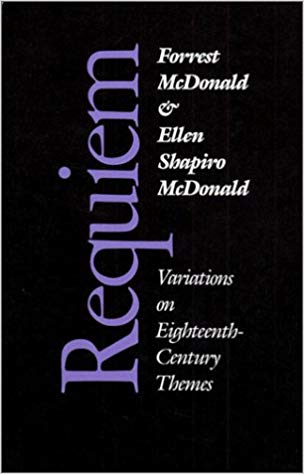The best historical writings, whatever their subject matter, have certain characteristics in common. All display a deft mastery of primary sources, building up from a solid base of fact without allowing the data to drag them down into pedantry. They also bear on their faces both an open and honest viewpoint and objectivity. That is, the best historian is a writer of conviction and values who is yet able to view all sides of a question and to state opposing arguments honestly, the rarest of all faculties in modern discourse. Then, the best history must deal with high and not trivial matters. Finally, the best histories are relevant, not in the sense of pandering to the fashions of the moment, but in the sense that they give any intelligent reader food for thought about his own times.
These virtues are all splendidly marshaled in Requiem, the McDonalds’ collection of occasional pieces on the early years of the American federal republic. Each of the 11 essays takes up a familiar and problematic question of those days—Shays’ Rebellion, John Dickinson, the “middle party” in the Philadelphia Convention, the relation of the Kramers to capitalism, the ambivalent evolution of the doctrine of separation of powers, the rituals of 18th-century war in relation to the American War of Independence, the role of Alexander Hamilton, the legacies of Washington and Jefferson to the office of the presidency, and others. And each is a gem of historical analysis, interpretation, and nonsuperficial relevance, from which the Founders emerge as neither plaster saints nor archaic curiosities, but as real, flawed, and extraordinary human beings.
It is probably true that all good history is sober, if not indeed somber; such must be the usual reaction of any honest student of the human condition. Few experiences are more sobering than being regularly compelled to compare the achievements of our Fathers with what 20th-century Americans have made of those achievements, which perhaps justifies the melancholy title of this collection. The respectful realism of these essays provides a good antidote to the mindless sentimentality of sunshine patriots and the compulsive hectoring of self-appointed re-Founders under whom we have suffered during the Constitution’s bicentennial celebration.
The last essay is a masterful historical exposition of “Federalism in America” and concludes with the wisest and saddest words of the bicentennial: “Political scientists and historians are in agreement that federalism is the greatest contribution of the Founding Fathers to the science of government. It is also the only feature of the Constitution that has been successfully exported, that can be employed to protect liberty elsewhere in the world. Yet what we invented, and others imitate, no longer exists on its native shores.”
[Requiem: Variations on Eighteenth-Century Themes, by Forrest McDonald and Ellen Shapiro McDonald (Lawrence: University Press of Kansas) 216 pp., $19.95]

Leave a Reply